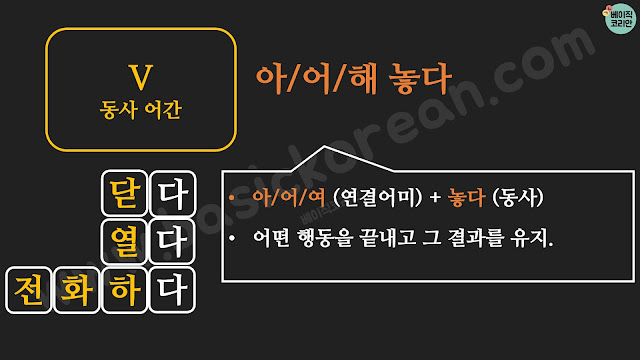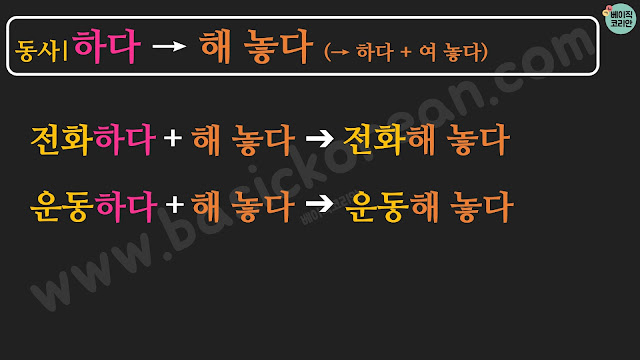Learn Korean | Korean Grammar 116: V-아 놓다/어 놓다/해 놓다
In this lesson, we're going to learn 'V-아 놓다/어 놓다/해 놓다'
‘문을 열어 놓았어요.’
🎬 Korean Grammar 116: V-아 놓다/어 놓다/해 놓다: https://youtu.be/SCuWpfSkMCc
 |
| V-아 놓다/어 놓다/해 놓다 |
(Nana and Miso are in the conference room. The conference room door is open.)
- 나나: 회의실 문이 열려 있는데, 닫을까요?
(The conference room door is open, should I close it?)
- 미소: 아니요. 더 올 사람들이 있으니까 열어 놓는 것이 좋을 것 같아요.
(Since there are more people to come, I think it would be better to keep it open.)
- 나나: 그럴까요? 그럼 계속 열어 놓을게요.
(That's right. Then I'll keep it open.)
2. Usage
► '아/어/해 놓다' attaches after a verb stem.
► It is an expression that combines the verb '놓다' after the connecting ending '아/어/여.'
► It is used to indicate that a certain act mentioned in the preceding statement is completed and its result remains.
 |
| V-아 놓다/어 놓다/해 놓다 |
✎ 문을 열어 놓았어요. (열다 + 어 놓다) (I opened the door.)
 |
| V-아 놓다/어 놓다/해 놓다 |
- '열어 놓았어요' is a combination of the verb '열다' and '-어 놓다'
✎ 문을 닫아 놓았어요. (닫다 + 아 놓다) (I closed the door.)
- '닫아 놓았어요' is a combination of the verb '닫다' and '-아 놓다'
- Time passed and at some point, 'I closed the door.' And the state remains.
- In this case, you can use '-아 놓다' after the verb '닫다' and say '문을 닫아 놓았어요.'
✎ 경복궁 입장권을 예매해 놓았어요. (예매하다 + 해 놓다)
(I bought a ticket for the Gyeongbokgung Palace in advance.)
- '예매해 놓았어요' is a combination of the verb '예매하다' and '-해 놓다'
- At some point, 'I bought a ticket in advance.' And the state remains.
- In this case, you can use '-해 놓다' after the verb '예매하다' and say '예매해 놓았어요.'
- '아/어/해 놓다' attaches after a verb stem.
-When the vowel before '다' is 'ㅏ' or 'ㅗ', '-아 놓다' is used.
1) Vowel ㅏ, ㅗ: -아 놓다
- 닫다 + 아 놓다 → 닫아 놓다
- 보다 + 아 놓다 → 봐 놓다
 |
| V-아 놓다/어 놓다/해 놓다 |
- When the vowel before '다' is other vowels other than 'ㅏ' or 'ㅗ', '어 놓다' is used.
2) Other vowels: -어 놓다
- 먹다 + 어 놓다 → 먹어 놓다
- 마시다 + 어 놓다 → 마셔 놓다
 |
| V-아 놓다/어 놓다/해 놓다 |
- When a verb ends in '하다', you can change '하다' to '해 놓다.'
3) 하다 → 해 놓다 (해 =하다 + 여)
- 전화하다 + 해 놓다 → 전화해 놓다
- 운동하다 + 해 놓다 → 운동해 놓다
 |
| V-아 놓다/어 놓다/해 놓다 |
※ 놓다 + 아 → 놓아 = 놔:
When '놓다' is followed by an ending that begins '-아', '놓아' can be shortened and say '놔.'
 |
| V-아 놓다/어 놓다/해 놓다 |
- 놓다 + 아 → 놓아 = 놔
- 놓다 + 아요 → 놓아요 = 놔요
- 놓다 + 았어요 → 놓았어요 = 놨어요
- 놓다 + 아서 → 놓아서 = 놔서
4. Practice
✎ 비행기 표를 미리 사 놓았어요. (사다 + 아 놓다)
(I bought my plane ticket in advance.)
✎ 어제 음식 재료를 준비해 놓았어요. (준비하다 + 해 놓다)
(I prepared food ingredients yesterday.)
✎ 수업 중에는 휴대폰을 꺼 놓으세요. (끄다 + 어 놓다)
(Turn off your phone during class.)
 |
| V-아 놓다/어 놓다/해 놓다 |
- 미소: 밖은 더운데 회의실은 선선하네요.
(It's hot outside, but the conference room is cool.)
- 나나: 제가 에어컨을 틀어 놨거든요. 추우면 에어컨을 끌까요?
(I turned on the air conditioner. May I turn off the air conditioner if you feel cold?)
- 미소: 아니요. 켜 놓으세요. 시원하고 좋아요.
(No, Leave it on. It's cool and good.)
→ 틀어 놨거든요. (틀다 + 어 놓다 + 았거든요)
→ 켜 놓으세요. (켜다 + 어 놓다 + 으세요)
#베이직코리안 #한국어문법 #Basickorean #Koreangrammar
_basickorean.jpg)
